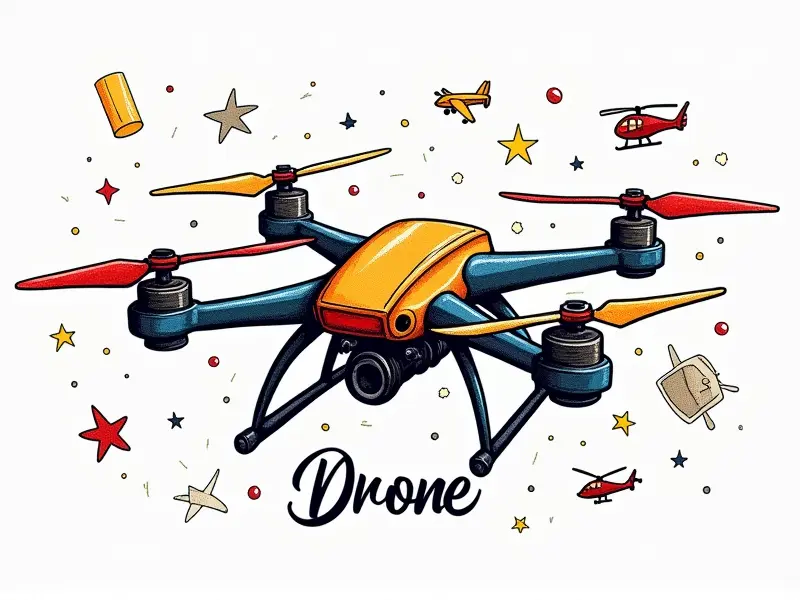Is flying a drone noisy?

Drones have become increasingly popular in recent years, offering enthusiasts and professionals alike the opportunity to capture stunning aerial footage, conduct surveys, and explore new perspectives. However, one common concern among drone users and their neighbors is the noise generated by these unmanned aircraft. This article aims to address this issue comprehensively, exploring whether drones are as noisy as they seem and what measures can be taken to minimize their impact.
Are Drones as Noisy as They Seem?
The perception of drone noise varies widely depending on the type of drone and its intended use. While some models can indeed generate considerable sound, advancements in technology have led to quieter alternatives. Understanding how different drones operate is crucial for assessing their actual noise levels.
Quiet Flight: Minimizing Drone Noise
To reduce the noise generated by your drone during flight, several techniques and equipment adjustments are available:
- Maintain Proper Propeller Balance: Ensuring that propellers are perfectly balanced can significantly lower the noise level.
- Select Quieter Motors: Opt for motors designed specifically to operate at lower decibel levels.
- Use High-Quality Batteries: Good batteries provide a steady power supply, which helps in reducing motor noise.
Comparing Drone Types by Noise Level
Different types of drones vary greatly in their noise output. For instance:
- Hobby Drones: Often louder due to smaller size and less emphasis on quiet operation.
- Commercial Drones: Designed for professional use, these models typically offer quieter performance through advanced engineering.
Reducing Drone Noise for Neighbors
To minimize disturbance caused by drone noise to nearby residents, consider the following tips:
- Choose Quiet Areas: Fly in less populated areas or times when disruption is minimal.
- Limited Flight Time: Restrict flight durations to reduce overall exposure to noise.
Tips to Reduce Drone Flying Noise
In addition to selecting quieter drones, adopting certain flying habits can also help decrease noise:
- Fly at Higher Altitudes: The sound of the drone diminishes with distance from the ground.
- Avoid Windy Conditions: Strong winds increase motor strain and generate additional noise.
Understanding Drone Sound Pollution Issues
The issue of drone noise pollution is gaining attention as more people engage in recreational flying. Understanding the impact on communities can help foster better regulations and practices to mitigate adverse effects.
Drone Decibels: Is It Too Much Noise?
Evaluating whether a drone's sound level constitutes excessive noise involves comparing it against established decibel limits for residential areas. Most drones fall within acceptable ranges, but specific models can exceed these levels.
Are FPV Racing Drones Super Loud?
Flying Phantom View (FPV) racing drones are notorious for their high-speed and agility, which often comes with increased noise due to higher RPMs of motors and propellers. However, advancements in technology have led to quieter options even within this category.
Quietest RC Quadcopters for Minimal Noise
If you're looking for drones that produce less noise, quadcopters designed with low-noise features are a good choice:
- Built-In Sound Dampening: Some models come equipped with sound dampeners to reduce vibrations and noise.
- Larger Propellers: Larger propellers can spin at lower speeds, reducing overall noise output.
The Impact of Drone Noise on Neighbors
Frequent drone operations in residential areas can lead to complaints from neighbors. Addressing these concerns proactively through regulation and education is crucial for maintaining a harmonious relationship between drone enthusiasts and their communities.
Debunking Myths About RC Airplane Noise
Many misconceptions surround the noise levels of remote-controlled (RC) airplanes compared to drones. While both can generate significant sound, modern advancements in RC airplane design have led to quieter models that are more suitable for residential use.
Conclusion
Flying a drone need not be an intrusive experience if proper precautions and considerations are taken into account. By choosing the right type of drone, adopting good flying practices, and understanding local noise regulations, enthusiasts can enjoy their hobby without causing undue disturbance to those around them. As technology continues to evolve, quieter drones will likely become more prevalent, further reducing concerns about noise pollution.

